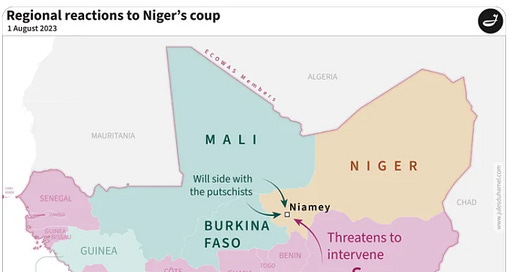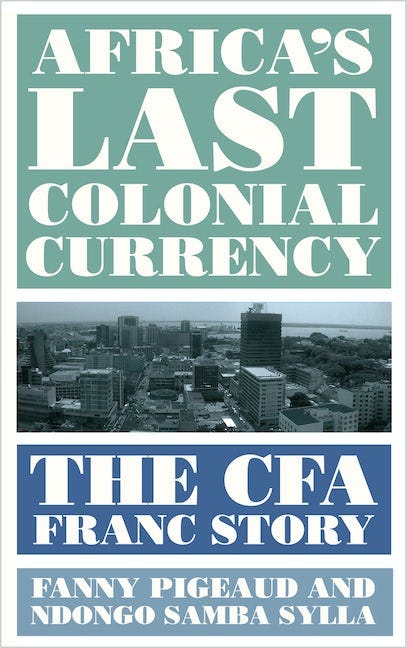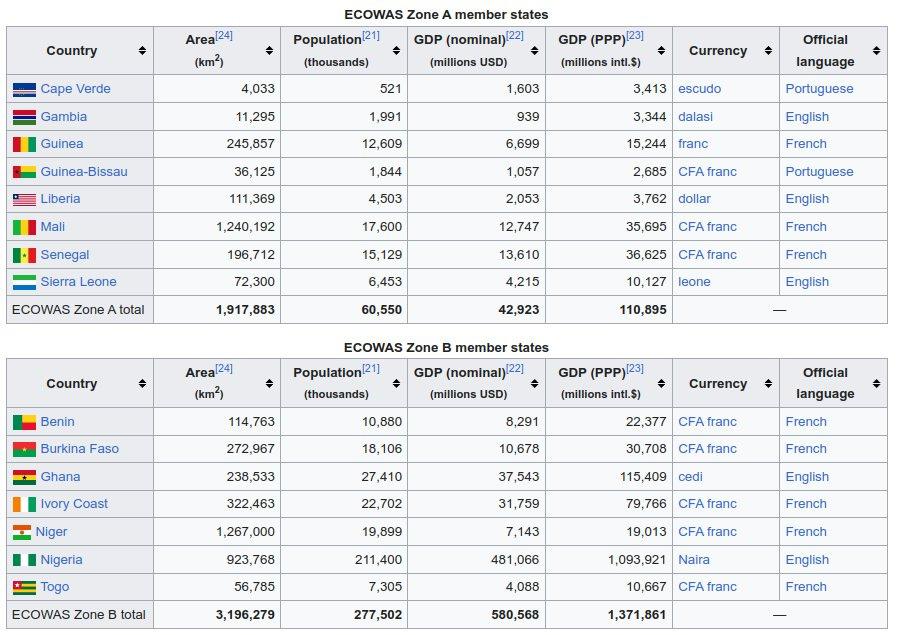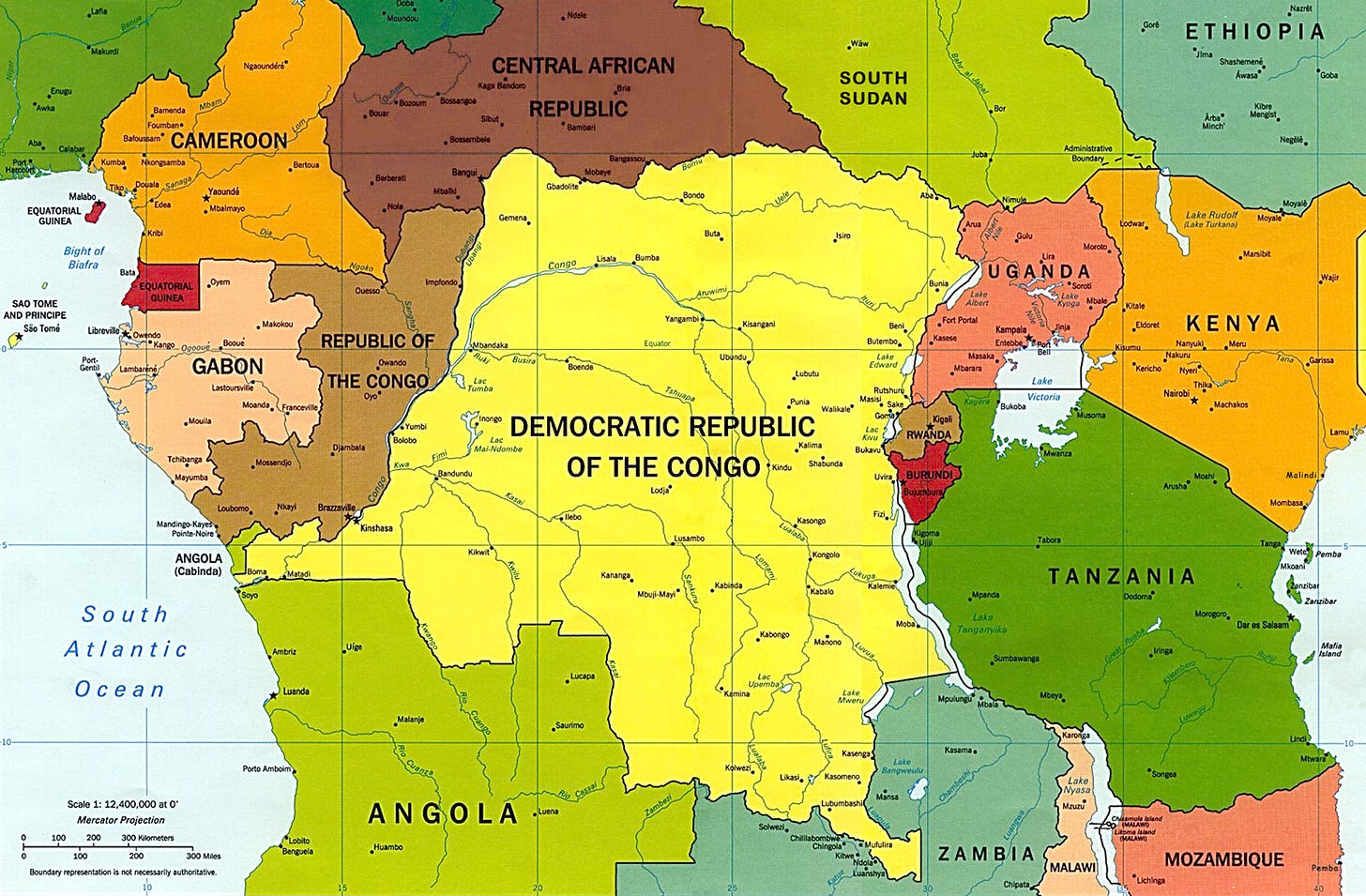Let’s continue to follow the post-coup situation in Niger. We had Victoria Nuland travel to Niger, presumably to help organize the overthrow of the government since 1- that’s usually what a visit from Nuland portends and 2 - a “rebel movement” called the Council of Resistance for the Republic under the leadership of someone named Rhissa Ag Boula started just after her visit. If there is going to be a Western war over this coup, it is likely that Nigeria - the giant country in West Africa with 224M people, much bigger than all other countries in the region combined - will be a part of the intervention, as would France and presumably the US. Other countries of the region are lining up on one or the other side, with Burkina Faso, Mali, and Algeria all lining up with the post-coup Niger government, so we are in a scary situation.
Like last time, I’ll discuss three angles on this situation.
Let’s add some detail about how France exploits its African neocolonies
I’ll tell you a story of how the US peels off French neocolonies so that it can plunder them (part of a pattern of how the US exploits its allies).
A brief mention of role of Nigeria in all of this and debates about it.
1. How France exploits its African neocolonies
I was doing research for the Scramble for Africa when I came across reference to a book called Africa’s Last Colonial Currency: The CFA Franc Story, by Fanny Pigaud and Ndongo Samba Sylla.
Going in, I had no idea what the CFA could possibly be but I assumed it was some mechanism France imposed to drain the resources of its colonies in Africa, which, like the British Empire’s mechanisms for draining India, were disconnected at Independence. But no, not disconnected at Independence.
Take a look at this table of countries in West Africa that still use it (while you’re looking, take a glance at Nigeria’s size relative to the other countries - we’ll use it later).
Reading the CFA Franc Story is like watching a Hollywood heist movie, except the thieves are finger-wagging, moralizing racists who steal by bureaucratic banality instead of plucky heroes with specialties like crisscrossing laser-triggered alarm rooms by doing gymnastics. The CFA Franc is fixed to the euro, and it is not convertible outside of the zone: “a citizen of the franc zone who goes to France will not find a currency exchange office willing to convert his CFA francs into euros or any other currency.” A Senegalese wanting to travel to Cameroon, as Pigaud and Samba Sylla write, will have to first exchange her Senegalese CFA Francs to euros, then change them back to Cameroon CFA Francs to use her money there. The central banks of these countries must hold their foreign currency reserves at the French Treasury (it used to be 100% of their reserves, now it’s 50%). France isn’t held to this rule and doesn’t keep its reserves in this pool. International business between these countries and third countries has to go through French banks, as Pigaud and Samba Sylla note:
Consider the example of a Malian company that sells cotton for a million dollars to a customer based in China. The million dollars owed to him by his buyer will have to go through the Parisian foreign exchange market to be traded in euros…
If you are familiar with the story of the US dollar as the global reserve currency, the concept of the petrodollar, and other concepts discussed in, e.g., the de-dollarization debates, you will see that the CFA Franc confers upon France the very thing that a French politician decried as the US’s “exorbitant privilege”. The shameless French politician complained about exorbitant privilege while doing the same thing to Africa via the CFA Franc! Pigaud and Samba Sylla note:
French representatives sit on the boards of the central banks as well as in their monetary policy committees, the bodies responsible for defining their monetary policy. This configuration has no equivalent in the world: no non-European citizen sits, for example, on the board of the European Central Bank, just as no non-US citizen is represented in the Federal Reserve.
To say simply what the effect is on African countries of having their currency pegged to that of France at the level that France decides: it means they pay too much for things from France and that France pays them too little for things from Africa. Pigaud and Samba Sylla:
The fact that the CFA franc’s parity was set at an artificially high level penalised African products: they were hard to sell on world markets, except in the context of the commercial preferences granted by the metropole. Conversely, the high external value of the CFA franc favoured imports, especially from the metropole.
Pigaud and Samba Sylla quote an extraordinary article from the eve of Independence, worth quoting at length:
While the path towards the independence of the CFA countries was underway, the French newspaper La Croix dedicated almost an entire page, in its 17 February 1960 edition, to an assessment of the franc zone. ‘It has allowed France to obtain supplies of various raw materials (lead, zinc, manganese, nickel, wood, phosphates, oilseeds…) without the need to disburse any foreign currency’, the article explained. ‘It is estimated that this has resulted in a saving of 250 million dollars a year. In 1954, the metropole purchased goods totalling 365 billion francs from the overseas territories (excluding Indochina), while it exported goods (mainly finished products) to those same territories for a total of 465 billion francs. It is estimated that the livelihood of 500,000 French people from the metropole depends on the economy of the franc zone.’
It amounts to free stuff for France - multiple countries, tens of millions of people, most of whose labor enriches France alone - and income deflation for all the African countries of the CFA Franc zone.
This is a vile system and no African leader would want to be a part of it. When Guinea under Sekou Toure escaped the system, France tried to overthrow him. Mali under socialist Modibo Keita escaped the system and introduced the Mali Franc in 1962; Modibo Keita was overthrown in a French-backed coup in 1968 and Mali re-entered the CFA franc zone in 1984. Socialist Sylvanus Olympio of Togo announced a sovereign currency for independent Togo in December 1962, and was assassinated in January of 1963. Togo stayed in the CFA Franc zone.
There is plenty more in this fantastic book, including a section called A Problematic Pegging, but I will leave some of it for another time.
The point is this: France enriches itself by imposing income deflation on the countries of the CFA Franc zone. It impoverishes the people, and perhaps also of note, humiliates the elites, who have their finances go through France’s banks instead of participating in the global economy like other African countries not subjected to the CFA Franc regime.
2. France offers protection to its colonies… just not from regime change, state collapse, or genocide
In my book America’s Wars on Democracy in Rwanda and the DR Congo, I tell the story of the long war that started in 1990 when the Rwandan Patriotic Front invaded Rwanda from Uganda, continued in 1996 and 1998 with successive RPF invasions of the DR Congo, and ended in around 2003 when Angola and Zimbabwe pushed Rwanda out of most of the Democratic Republic of Congo. The book took many years to write and most of those years were just used up figuring out what happened. What I want to do here isn’t reprise those 400 pages but look at the story from a different angle, as another example of the US attacking its own ally, in this case France.
Before Paul Kagame became the president of Rwanda and Rwanda became a part of the US orbit, the country was another part of the French system. Like other French neocolonies, Rwanda would call France to send an expeditionary force whenever there was some threat to stability. And indeed, when Kagame’s Rwandan Patriotic Front made its first forays into Rwanda from Uganda in the late 1980s, the French army was on call to fight the RPF off. That dynamic changed when the United Nations force was introduced, under the pro-US Canadian commander Romeo Dallaire. In my book I quote Dallaire’s autobiography, in which he speaks of his admiration for Kagame and of his contempt for France and of Rwanda before Kagame took it over. At one point Dallaire proudly relates that he “told New York that if the French were permitted to enter [through Kigali], I would resign my command; if French planes appeared at the airport, I’d shoot them down.” Official France found all of this confusing, since these were the sorts of things France did in all of its African possessions. But Kagame and Dallaire were with the US, not with France. The Rwanda and Congo wars of the 1990s were some of the worst events in the region’s history, but from the imperial perspective they were less about genocide, state collapse, and the deaths of millions of people and more about a handover of neocolonial control in Central Africa from France to the US.
But US and French neocolonialism work a bit differently, or at least, the neocolonialism of the 1960s-1980s worked differently from the way the US runs things after the 1990s. Shortly after Independence, the idea was to install parliamentary regimes that would follow Western rules or military dictators that would do the same. Stability was the goal. Since the 1990s, the neoconservative goal is to break states up and run covert military and economic operations in border areas. The US likes these “triangles of instability”, from which resources can be looted without negotiating with a central state and where insurgencies can be ramped up and down to put pressure on the next state.
Think of the border between Rwanda, Uganda, and the DR Congo, where the mining resources are plundered. Or the territory of Syria bordering Iraq and Turkey, from which the US steals oil and wheat. Or the border regions of Mali, Burkina Faso, Niger, Chad, Cameroon, Nigeria, where US AFRICOM has operated freely since the destruction of the Libyan state in 2011 and where the various Islamic State insurgencies seem to roll on and on.
If US elites decide they want something - whether that something is a state collapse in a French ally, or a flagship French corporation like Alstom, France will hand it over. To say the least, this reduces the appeal of French patronage for its clients.
3. What will Nigeria’s role be?
Several signposts on the road to US-created chaos have been passed already. The Victoria Nuland visit. The declaration of a rebel group. And the identification of a regional power that has the capacity to intervene. The latter power is Nigeria. If Nigeria does invade Niger, it will be a country that doesn’t suffer under the CFA Franc fighting to keep another country within it.
The West African community, ECOWAS, is meeting in Nigeria at the moment and Nigeria’s president has signalled an intention to intervene since the coup happened. Within Nigeria, there’s opposition to intervention, on the argument that Nigeria doesn’t need to carry the West’s water, nor should Africans do the dying for the agendas of others. The Nigerian Senate has been trying pass a resolution to rule out intervention in Niger, arguing there’s already a US base there and there’s no need to deploy troops “to please Americans and other Western countries.”
There will be more to say about all this — from the Boko Haram insurgency to Nigeria’s other military interventions in, e.g., Liberia (1990-7), Sierra Leone (1991-8), Guinea-Bissau (1998-9), the Gambia 2017… but that will take this post in a different direction, so I’ll leave the Nigeria discussion here for now.
Last year, the now-ousted president Mohamed Bazoum said in an interview that Niger was France’s privileged partner. Fair enough: not all partnerships are equal. But for Africa, French partnership isn’t just unequal, it’s miserable. France offers an economic partnership that brings poverty and a security partnership that brings state collapse. The interview concluded with the following assessment by Bazoum:
“As for the growing discontent of the Nigerien population with the presence of foreign troops in the country, President Bazoum dismissed this attitude as the result of the exploitation of a different situation by the social media.”








